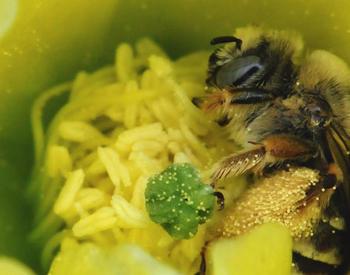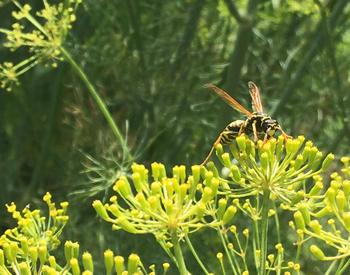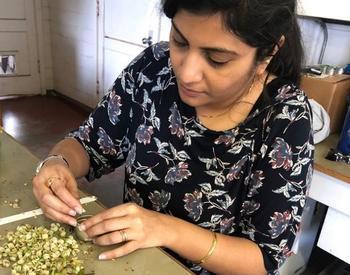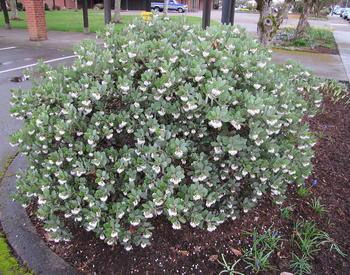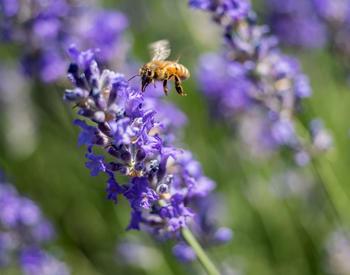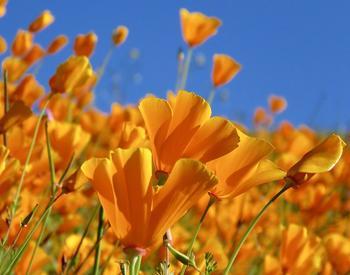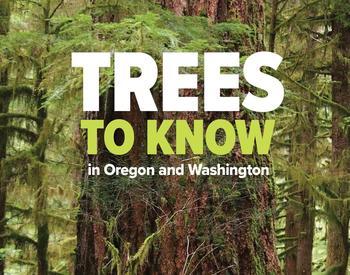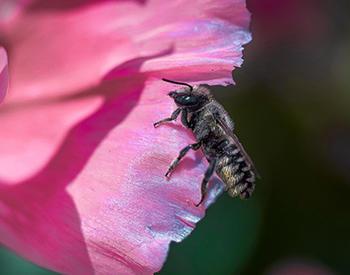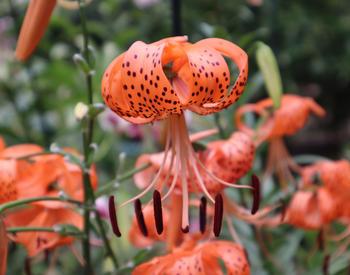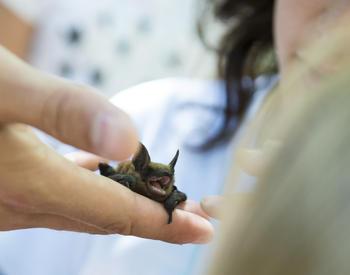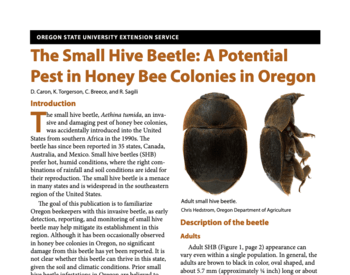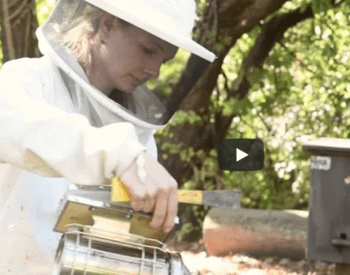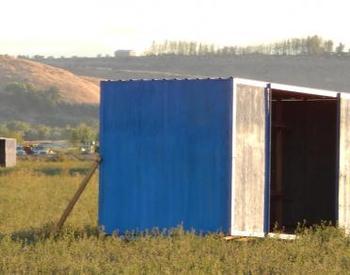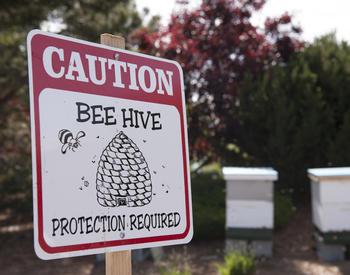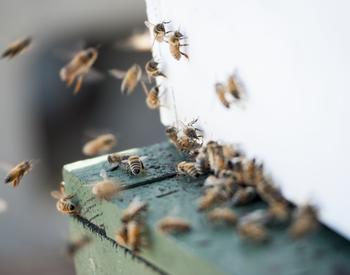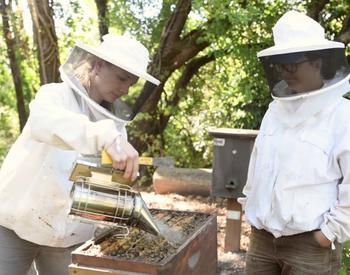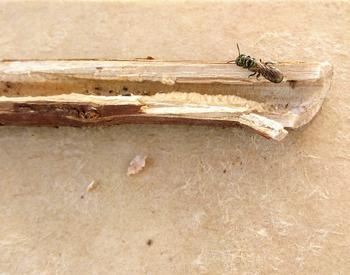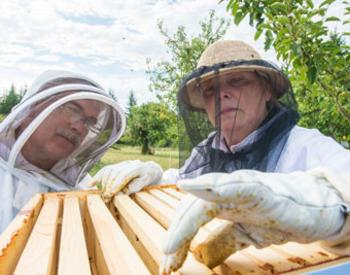Transcript
Speaker 1: From the Oregon State University Extension Service, this is Pollination, a podcast that tells the stories of researchers, land managers, and concerned citizens making bold strides to improve the health of pollinators.
I'm your host, Dr. Adoni Melopoulos, assistant professor in pollinator health in the Department of Horticulture. The Oregon Legislature is back in session this week, and we thought it would be a great opportunity to catch up with Representative Jeff Riordan, Representative for District 48, Happy Valley in the Oregon Legislature. Back in 2015, Representative Riordan was the sponsor of a comprehensive legislative house bill that put real resources into providing education for Oregonians on how to protect pollinators, but also diagnostic tools for beekeepers. No other legislature anywhere in the United States has passed anything as comprehensive as this bill, which has earned Representative Riordan the title of the bee guy in the legislature. So, on today's show, we're going to hear about what was in that 2015 house bill, 3362, a little bit about the process through which the bill was developed, what's in the bill, and some of the features that really make it stand out as a cornerstone to pollinator health in the state of Oregon. So, sit back and enjoy this legislative edition of Pollination. All right.
Well, I am in Salem today with Representative Riordan. Welcome to Pollination. Well, thank you.
I am just delighted to be here. As listeners know, I've been in Oregon for about a year, and one of the things that really attracted me is that Oregon is set to have one of the most innovative and comprehensive approaches to pollinator health in the U.S. And this is a large measure because where these measures are coming out of is an actual law. The legislature sat down and came up with something to tech bees for Oregonians. And I just wanted to have you walk us through where this legislation came from.
Speaker 2: Well, I have to chuckle a little bit because I actually started working on this in 2012. I'd been elected, but I hadn't yet been sworn in. And then we had this major bee die-off in the Wilsonville area. And reading a paper and looking at that, and I thought, well, gee, somebody should do something about that. And I thought about it for another week or so, and I realized, hey, I got elected.
I can do something about that. And that's really my first legislation that I actually worked on was this. So, it was kind of funny. It sort of opened my eyes to, hey, this getting elected is okay. I can actually work for some pretty good causes. I ran on primarily education, the economy, and the environment. So, definitely have an interest in making the world a better place. And that's how I got started on this.
Speaker 1: So, from the point of when you sort of thought, you know, something's got to be done to the legislation, that must have been a, as you mentioned, you've been thinking about this as 2012. Walk us through those steps.
Speaker 2: Well, there were a lot of folks that wanted to ban Neonicotinoids. That was the original concept that came up. And so, I brought that in as a bill concept, brought it to my leadership.
And I got a very clear, I won't quote the exact statement, but very clear that that bill was going nowhere. I would not get to a bill banning Neonic. What they said they wouldn't be happy to do is do a task force and talk about what we could do. And so, we ended up in 2013 as a task force bill. And then that generated the ideas for the subsequent bills that we did end up passing.
But, you know, it was great. We had people from, you know, different agencies within the state, from the university system, nursery associations played a very active role. The Farm Bureau was involved. So, probably had at least a dozen different folks around the table working on generating some ideas and kind of figuring out, you know, what we needed to do.
Speaker 1: So, the task force was this way of kind of getting a temperature and getting a sense of what could be done amongst different groups in Oregon. What were some of the things that you learned when you were sitting back and listening to the discussion? What were some of the things that you still don't have in your mind?
Speaker 2: Well, it was really interesting. We had, you know, the AgAgency Department of Agriculture has a great program of educating the licensed applicators. And so, it's really impressive. They buy their books.
They go to school and study hard. So, that's great. Lots of information, except that the B-Kill-Off, the Initiator Disp, was actually done by licensed applicators. So, I'm thinking, okay, we have other folks that use these same similar chemicals and they have like little to no education. So, one of the things that did come up quite a bit was where do these people get their information. And we realize a lot of times, it's off the labels that's on the product.
So, they go to their, whatever this story is and why these products, they have information they may or may not read. Often, they would maybe put that chemical away for the year. They come back next spring and say, oh, hey, I remember how to use that.
So, a lot of, or not very much information, is probably not always retained. And so, we're really concerned about how do we inform the backyard gardener, you know, if the trained licensed applicators are having this much trouble with these chemicals. And this kind of an issue, what do we do for the backyard gardeners?
And I put myself in that category. We have a, you know, a small lot out of Southeast Portland with a lot of plants and, you know, I want to take care of those, but I don't know as much as I'd like to about them. So, that was kind of one of the major issues that we decided to really focus on how do we educate people? How do we get the word out about protecting pollinators?
Speaker 1: You know, that's one thing about the bill that struck me when I first read it was, you know, the word broad appears in the legislation a number of times, that there is, there are these trained people who are licensed applicators, but the intent of the legislature was really to provide resources for the general public as well.
Speaker 2: Yeah, and Oregon has a great, you know, extension service. And so it was a natural fit to have them working with the Department of Agriculture to kind of develop the materials and the outreach program. So that's been underway for a while now. And to me, I think that was as important as any other part of the bill.
Speaker 1: Let's take a quick break. And I want to come back and talk about some of the elements. I'm sure there are people in other states who are listening to the show and really want to know, you know, how Oregon sort of shaped this legislation and what's in it. So let's come back after a break and we'll talk about the details.
Okay, that sounds great. All right, we were talking before the break about House Bill 3362, which, you know, is really a historic piece of legislation. I don't think it has an equal anywhere in the U.S. And you're talking a little bit about the educational components. What else is in, maybe just give us a broad overview of what's in the bill.
Speaker 2: Well, we talked about, you know, necessarily, you know, hiring somebody to run that program, running the educational creation and distribution of information through the extension service. But the other part of that was to create a funding stream.
Because that's going to be work that, you know, has to continue for some time. So we did put that into the bill as well. So there's a reporting system that's part of that. And then we have some permit fees based on the number of hives that somebody would have pesticide registration fees. And all of that goes toward the outreach and then the diagnostics as well. So, we have the outreach, and then how do you how do you fund it?
Speaker 1: No, that's great. There is the education part, but there is also, and we did have Dr. Seguili on an earlier episode talking about the diagnostic capacity at OSU Beekeepers in Oregon really have a high-quality diagnostic service where if they have problems, they can really sort it out quickly.
Speaker 2: Yeah, I've been down to there, down to the lab actually after we passed the legislation, but I worked with Dr. Ramesh Seguili for over a year on this. He was on a task force as well. And, you know, it's so exciting to see what they were already doing at Oregon State, but he convinced me that if we're really going to be able to do the diagnosis, I mean, they were able to go out into the field and do the studies, but to do further diagnosis and also provide that service to others from across the nation, then he needed additional equipment. So we got a little bit of money together for him. And so I did go down and visit, visit the lab. It was really neat to see the new equipment.
It wasn't all there. Had an open purchase when I got there, but the students at work, and some of the other employees that were working there as well, but really building up to where I think Oregon State should be just a real national leader in this area.
Speaker 1: You know, the other, the other thing about that is significant is, you know, there's sometimes the legislatures want to kind of tackle some of these issues, but it is a funded mandate. There are resources available to actually do a lot of education that a lot of many states struggle with.
Speaker 2: Yeah, we just knew that was important. It's one thing to have great plans and ideas, but if you don't back it up with some money, then it's pretty pointless. So this is something that in my mind, I just wanted to go on for as long as there's a need. And I think that will be a long time.
Speaker 1: I can imagine that things come up whenever you pass a bill. A piece of legislation comes into law and there are things you haven't foreseen. Has there been any kind of updates to the bill?
Speaker 2: Well, it's funny you mentioned that. Indeed, there was. So I'd mentioned the importance of having a good funding stream. And so part of that was the beekeepers would have to pay a certain amount based on the hives. Well, unbeknownst to me, there are two types of hives. There are production hives and there are nucleus hives. So the nucleus hives, they don't generate any revenue based on those. Those are just an important part of the beekeeping process. So we had to come back in 2016 and make that a little bit more clear that we really only wanted to collect money from the producing hives.
Speaker 1: The hives that actually helped the farmers generate revenue. So innocent mistake. Nobody had really thought about it during the task course when we were generating these ideas. Nobody caught it in the bill-writing process.
And even though we had a lot of involvement in the task force and the bill review, during that original testimony, all of that, we all missed it. So just to me, a small thing, to them, a big thing. So they were really happy to be able to come in and work with me again to fix that up. I remember actually being at the table when that was being discussed, and it was a really interesting process of just kind of clarifying, getting the beekeepers too, you know, for them at second nature, obviously, this is what they do for a living, but to translate that to people who don't know is interesting.
Speaker 2: Well, and that's why on, no matter what the legislature is, no legislation, whether it's this or some other topic, to have the experts come in. Part of my job is just to be a really good listener and to try to understand, you know, what the objectives are, the proposed legislation, and work with people that actually know what they're talking about and allow them to work on the review process. And so it's a part of the job that I really enjoy. And I think, you know, if this is any example, we can get pretty good results.
Speaker 1: Well, let's take one more break, and we're going to come back. I have these questions that I ask all my guests. I'm really curious what your answers are going to be.
Speaker 2: Okay, I'm curious about your questions.
Speaker 1: We're back with Representative Reardon, and we have three questions we ask all our guests. The first question is, is there a book on bees that you like?
Speaker 2: Well, I've recently learned about the Oregon Department of Agriculture's book, and I really like it. It's the Common Bee Pollinators of Oregon Crops, and I like it because it'll fit in my pocket. And it just shows great photographs of some of the different bees that we'll see around the state, a little bit of information about them. So I think it's really handy, and it's beautiful.
Speaker 1: So I think I do like about it as well as what you were saying is that the pictures are really good. And we were having this conversation earlier that really something like this should be turned into an app.
Speaker 2: Absolutely. It's been my dream, I think since we had the task force. There should be an app for that. That's where I wanted it. So maybe we'll get there. Let's be patient.
Speaker 1: The idea was planted here. No pressure. Now, the next question, maybe a little unusual for you. Sometimes we have conservationists on the show, or we have beekeepers, but we ask them, what's an important tool for you for the kind of work you do with pollinators?
Speaker 2: Well, in my work, being a state representative, obviously the legislative process is the most important thing. So that's like I talked about earlier, I'm able to hear the issues and try to work with really smart people to come up with better solutions than what we have today. So the legislative process is my best tool.
Speaker 1: Excellent answer. Our last question for you today is, do you have favorites? Do you have a favorite pollinator? Is there a bee that when you see, you're like, I like that bee?
Speaker 2: Well, everybody likes the honeybee, but...
Speaker 1: You're holding up the Bees of Oregon poster there.
Speaker 2: Yeah, the Bees of Oregon poster. It is just gorgeous. And when I look at this, the small carpenter bee just really draws my eyes. It's just beautiful metallic blue. And so I love the picture, but I must say that I honestly stay away from any bees or wasps. I'm terribly allergic to them.
Really? So I will just swell up terribly. I've gone through the treatment.
I'm on a maintenance plan now where I get my venom shots every four to six weeks. But for somebody who wants to preserve bees, they're just not doing me any favors when they stick and get too close.
Speaker 1: That has got to be one of the greatest ironies in Oregon legislative history.
Speaker 2: It's a painful twist of fate, so to speak.
Speaker 1: Well, thank you so much. The legislative session starts next week. It does. And busy time for you.
Speaker 2: Yeah, it's getting very hectic already. We've been hard at work since early January and before that as well, but really picked up in early January. So we're ready to hit it again and it's enjoyable work most of the time.
Speaker 1: Well, on behalf of all our listeners, thanks for all your hard work on the bee front.
Speaker 2: You're more than welcome. This is one of my favorite projects ever.
Speaker 1: Thanks so much for listening. Show notes with information discussed in each episode can be found at pollinationpodcast.oregonstate.edu. We'd also love to hear from you and there are several ways to connect. For one, you can visit our website to post an episode-specific comment, suggest a future guest or topic, or ask a question that can be featured in a future episode. You can also email us at [email protected]. Finally, you can tweet questions or comments or join our Facebook or Instagram communities. Just look us up at OSU Pollinator Health. If you like the show, consider letting iTunes know by leaving us a review or rating.
It makes us more visible, which helps others discover pollination. See you next week.
Representative Jeff Reardon has served the East Portland District of Happy Valley (District 48) in the Oregon Legislature since January 2013. Shortly after coming to office there was a tragic pesticide poisoning of bumble bees in a suburban big-box parking lot in Portland. Although he had been thinking about pollinator health before his election, he quickly found himself at the lead of an initiative to strike a Pollinator Health Task Force and then a comprehensive House Bill around pollinator health. House Bill 3362 is without equal in the United States and has not only tasked the Oregon State University Extension Service and state agencies to work on pollinator health, but has also committed resources towards carrying out this work. Representative Reardon was born and raised in the blue-collar town of Kelso, Washington and is a Vietnam Era Veteran (having served on a nuclear submarine in the Western Pacific). He had a busy career before entering politics, not only as a high school teacher but also as a communications manager with Tektronix.
Listen in as we talk about Reardon’s landmark bill, what it has done for pollinators, and how he involved the bee-keeping community.
You can Subscribe and Listen to PolliNation on Apple Podcasts.
And be sure to leave us a Rating and Review!
“[The Oregon Pollinator Health Bill] is one of my favorite projects, ever.“ – Jeff Reardon
Show Notes:
- How Reardon’s landmark bill got started
- How the bill evolved from initial intention
- Who the key players were in passing the legislation
- What is in the bill, and who it was for
- How communication with beekeepers has helped revise the law for the better
- Why Jeff is so passionate about the project
“We’re really concerned about how to inform the backyard gardener about pesticides and pollinators. If the trained license applicators are having this much trouble, then what do we do for the backyard gardeners?“ – Jeff Reardon
Links Mentioned:
- Learn more about the Oregon Task Force on Pollinator Health and House Bill 3362
- Check out Representative Readon’s favorite book, “Common Bee Pollinators of Oregon Crops”
- Find out more about favorite tool, “The Legislative Process: How ideas become law”
- Learn more about Representative Reardon’s favorite bee: Ceratina – Small Carpenter Bee
- Connect with Representative Jeff Reardon
